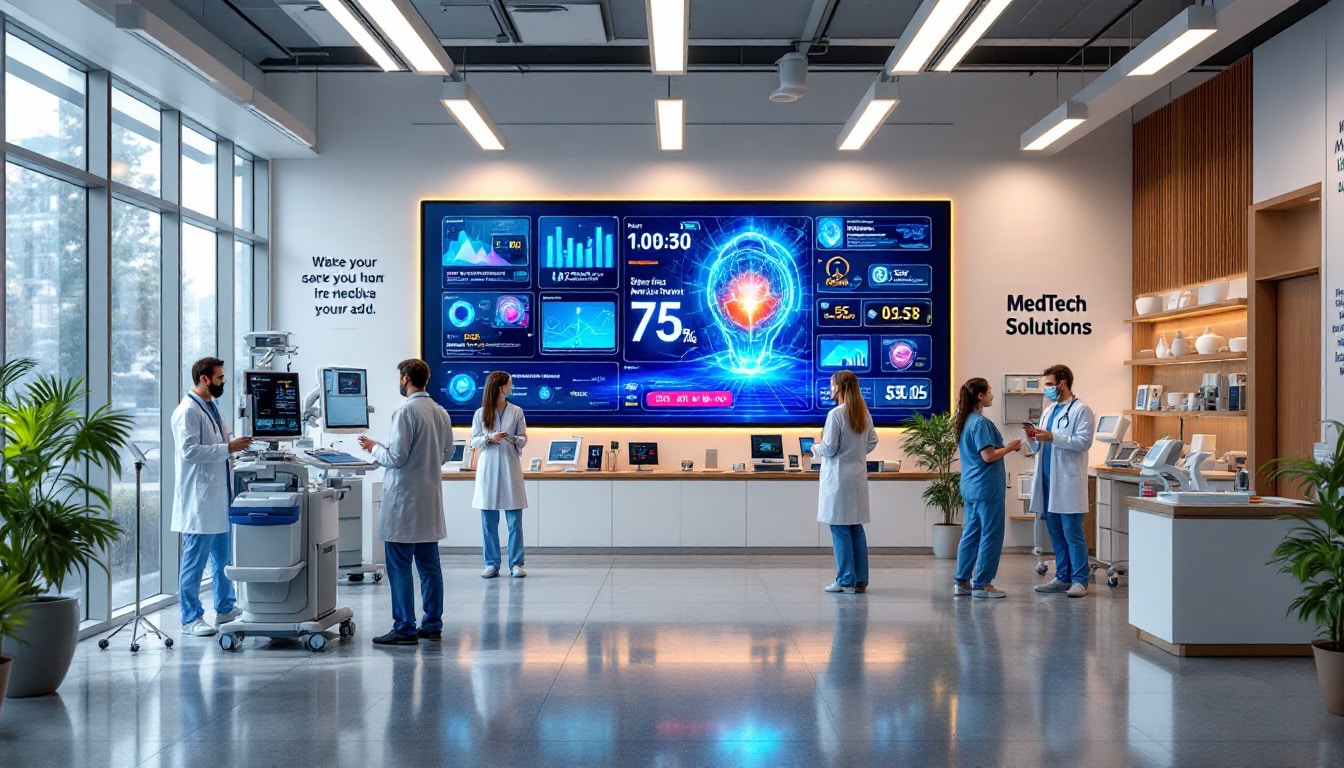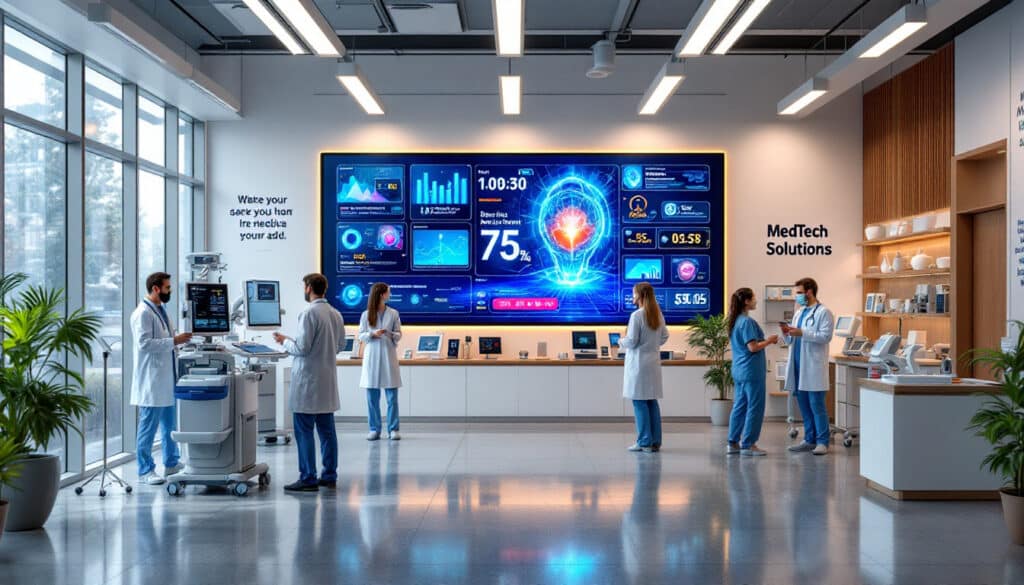The global business landscape is in turmoil. The new tariff measures announced by President Trump promise to disrupt international trade. The base tariffs of 10% will come into effect on April 5, affecting countries like the United Kingdom, Australia, and Saudi Arabia.
Other nations such as the European Union, Japan, and China will see their tariffs increase up to 54% starting on April 9, thereby exacerbating trade tensions. This decision risks escalating a global trade war, particularly impacting the medical innovation sector. Organizations like AdvaMed and MedTech Europe express their concerns, highlighting the negative repercussions on innovation, employment, and healthcare costs. Their position aims to protect competitiveness and the quality of care within the medical ecosystem.

“`html
In April 2023, President Donald Trump announced the imposition of tariffs on several countries, raising concerns within the medical technology industry. These measures, which take effect starting April 5 for some countries and April 9 for others, have a significant impact on global trade and, in particular, on the medical technology sector.
What are the details of the new tariffs imposed by Trump?
April 5 marks the beginning of the application of base tariffs of 10% for countries such as the United Kingdom, Australia, and Saudi Arabia. These modest tariffs aim to limit trade tensions without excessively disrupting established economic relationships. However, other countries including the European Union, Japan, and China will see more significant tariff increases of 20%, 24%, and 54% respectively, starting April 9. These substantial increases risk intensifying the global trade war, affecting various sectors, including that of medical technologies.
For more information on the steps to take in light of these new regulations, consult this resource.
Why is AdvaMed opposing tariffs for the medical technology industry?
The President and CEO of AdvaMed, Scott Whitaker, has expressed his concern over the announcement of widespread tariffs. Although AdvaMed supports policies aimed at strengthening the U.S. position in medical innovation, the association believes these tariffs will have harmful consequences for the industry. Whitaker stated: “If these tariffs are implemented as planned, they will act as a consumption tax, negatively impacting innovation, destroying jobs, and increasing overall healthcare costs.”
AdvaMed highlights the crucial role played by the medical technology industry in the healthcare ecosystem in the United States and its importance for the country’s continued economic growth. The association advocates for a exemption from tariffs for medical technologies, emphasizing that traditionally, industries with significant humanitarian missions have enjoyed similar exemptions.
To deepen understanding of current regulations, visit this article.
What will be the impact of tariffs on innovation and employment in the medical sector?
The tariffs imposed by the Trump administration risk transforming the medical technology industry into a less favorable environment for innovation. By increasing the costs of imported components and materials, companies may see their margins reduced, thereby limiting their ability to invest in research and development. This situation could also lead to a decrease in jobs in the sector due to the necessity to cut operational costs.
Moreover, the rising costs of medical technologies could have a domino effect on the healthcare system, leading to an increase in healthcare prices and a decrease in access to advanced technologies for patients. This situation would run counter to the goals of improving health and well-being for patients, which are at the core of AdvaMed’s mission.
How are European and British organizations reacting to Trump’s tariffs?
In response to the imposition of U.S. tariffs, the European Union and the United Kingdom have expressed their concerns. MedTech Europe, the European equivalent of AdvaMed, participated in a public consultation regarding the EU’s countermeasures and expressed strong concerns over the inclusion of many medical product codes in potential counter-tariffs. The association insisted that medical devices and their essential components be exempted from any tariff measures to preserve competitiveness and quality of care in Europe.
For its part, the UK government has established a “provisional list” of American products that may be taxed in response. However, it has not yet taken immediate action, an approach supported by the Association of British HealthTech Industries (ABHI). The ABHI emphasized that premature action could harm the availability of healthcare technologies for NHS patients, compromising the quality and safety of care.
To explore how the healthcare sector is preparing for these changes, check out this detailed article.
What strategies can the medical technology industry adopt in response to the new tariffs?
To mitigate the impact of the tariffs, medical technology companies may consider several strategies. One approach is to relocate some of their production to countries not affected by the new taxes, thus reducing costs related to tariffs. Another strategy could involve increasing local innovation by investing more in research and development to create products less dependent on imported components.
Additionally, companies can enhance their collaboration with government authorities and industry associations such as AdvaMed to advocate for favorable policies and specific exemptions. By working together, the industry can strengthen its political impact and influence tariff decisions to protect innovation and employment.
Finally, a proactive adaptation to the new regulations, by mastering compliance processes such as those described in the resources from Global Santé, will enable companies to navigate more effectively in this new economic environment.
The CEO of AdvaMed expresses deep concern over the Trump administration’s intent to impose widespread tariffs on the medical technology industry. This initiative, he argues, could act as a consumption tax, negatively impacting innovation and increasing costs within the U.S. healthcare system. As the leader of an organization dedicated to advancing medical innovations, Whitaker emphasizes the critical importance of maintaining an environment conducive to research and development, essential for ensuring patient well-being and the economic competitiveness of the United States on the global stage.
Whitaker points out that the broad tariffs risk stifling the growth of the medical technology industry by limiting access to essential materials and components. He recalls that, historically, sectors with significant humanitarian missions, such as the medical field, have benefited from tariff exemptions, allowing for unhindered international collaboration. This measure would not only have preserved innovation but also maintained valuable jobs within the industry while avoiding an increase in costs for the healthcare system.
Furthermore, Whitaker insists on the necessity of constructive dialogue with the administration to demonstrate the vital role played by the medical technology industry in the American healthcare ecosystem. He asserts that the proposed tariffs could compromise the ability of businesses to innovate and grow, thus undermining efforts to reposition manufacturing in the United States. By advocating for an exemption, AdvaMed seeks to ensure that economic policies support rather than hinder the advancement of medical technologies.
In conclusion, the position of the CEO of AdvaMed underscores the importance of a balanced approach that protects national economic interests while fostering ongoing innovation in the medical sector. He calls for a reassessment of the tariff measures to ensure that the medical technology industry can continue to thrive, innovate, and contribute positively to public health and the American economy.












